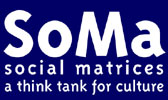
Notes
for Cybersalon Future Wireless Event
Dana Centre, London 4/10/2005
Giles Lane, October 2005
- Social Tapestries is a research programme exploring the potential benefits and costs of local knowledge mapping and sharing, what we have termed the public authoring of social knowledge.
- It extends and further develops our earlier project Urban Tapestries (UT) which created a prototype public authoring platform for spatial annotation using high definition geo data with mobile and wireless communications.
- UT sought to shift the debates around location-based services from one that privileged traditional ideas of media content being delivered to people, and instead focused on the potential for creating a 'public knowledge commons'.
- Proboscis' research concluded that the key point for most people in using communications technologies is that the provision of information is less important to people than using these technologies to meet up and maintain links between people and communities.
- A critical problem with lots of R&D projects is that they focus too often on scenarios and profiles of fictitious people and communities that tend to reflect the assumptions and pre-conceived ideas of the researchers involved. In investigating the possibilities of these technologies we created analogue and digital prototypes and worked with a range of people, from senior citizens and teenagers through the local community centre, to local and central government, academia, artists, designers, business people and technologists.
- In Social Tapestries we are creating a series of collaborations with actual people in real communities and environments to develop our technological solutions for a knowledge commons in response to the needs and capabilities we encounter. We are learning about the motivations for using or not using technologies that different people have, and also that these motivations change for individuals according to the different situations they find themselves in every day.
- Proboscis
is focusing on 4 areas for exploring knowledge mapping and sharing:
- education: where primary and secondary school students can gather knowledge about their local communities and environments as part of an associative learning approach to education.
- social housing: exploring how new forms of neighbourliness and empowerment for local communities could emerge through the mapping and sharing of local knowledge and experiences.
- community engagement: exploring how creative uses of public authoring technologies could enable people to participate in local regeneration and community development.
- public sector: where public authoring could be a means of forging a reciprocity of trust between public services and citizens as a two way communications channel.
- To achieve
this we have spent the last 18 months developing collaborations with
a number of communities and are beginning now to embed projects and
experiments with them, for instance:
- HIRO: working with a residents committee on a 900 dwelling 'sink' estate in West London to assist them in their ODPM funded 'Right to manage' process and estate regeneration plan.
- St Marks: working with a short life housing cooperative to use public authoring to capture the memory of their 25 year history of managing property and who benefited from it.
- Jenny Hammond: collaborating with a primary school on designing how to use public authoring as part of the core teaching and learning methods adopted in the school. We are also hoping to extend this project to one of the secondary schools it feeds students to to create a joint programme across age groups and schools.
- Feral Robots: exploring how to hack together environmental sensors (Volatile Organic Compounds etc) with toy robots and spatial annotation to enable local people to participate in mapping and social activism around local pollution issues.
- Kingston Council: we are designing a collaboration with Kingston Council as part of their Thinking Kingston programme to demonstrate how public authoring can be a powerful tool for local communities to develop social and creative networks through the sharing of local knowledge and experiences, and the role of local authorities in facilitating this.
- Wireless
Future / Issues:
- focus on technology deployments must go hand in hand with sensitive community development work, otherwise there is a danger that only the 'early adopters' and people most like those excited by the technologies will participate and this will exacerbate a 'digital divide'.
- wireless technologies are plumbing – the focus on what applications and services they will enable is critical. If all they offer is untethered internet access, then what exactly is so exciting about that? The services and opportunities that they give access to are more important.
- the biggest hurdle seem to me to be orchestrating and mediating not only the different technologies that wireless access could enable but also the social, cultural, political and economic forces that will shape and determine the uses of such technologies.
- we need to be developing projects which have not only a technology factor, but also work closely with actual people and communities, that understand the broader policy frameworks and how to lobby for change; that understand and can envision a wide range of economic benefits (tangible and intangible) and articulate their value in everyday terms; and that add richness to the cultural background of our society.
©
2004-2005 Proboscis. Some
Rights Reserved Last updated October 25, 2006 | sitemap | Join Mailing List |
